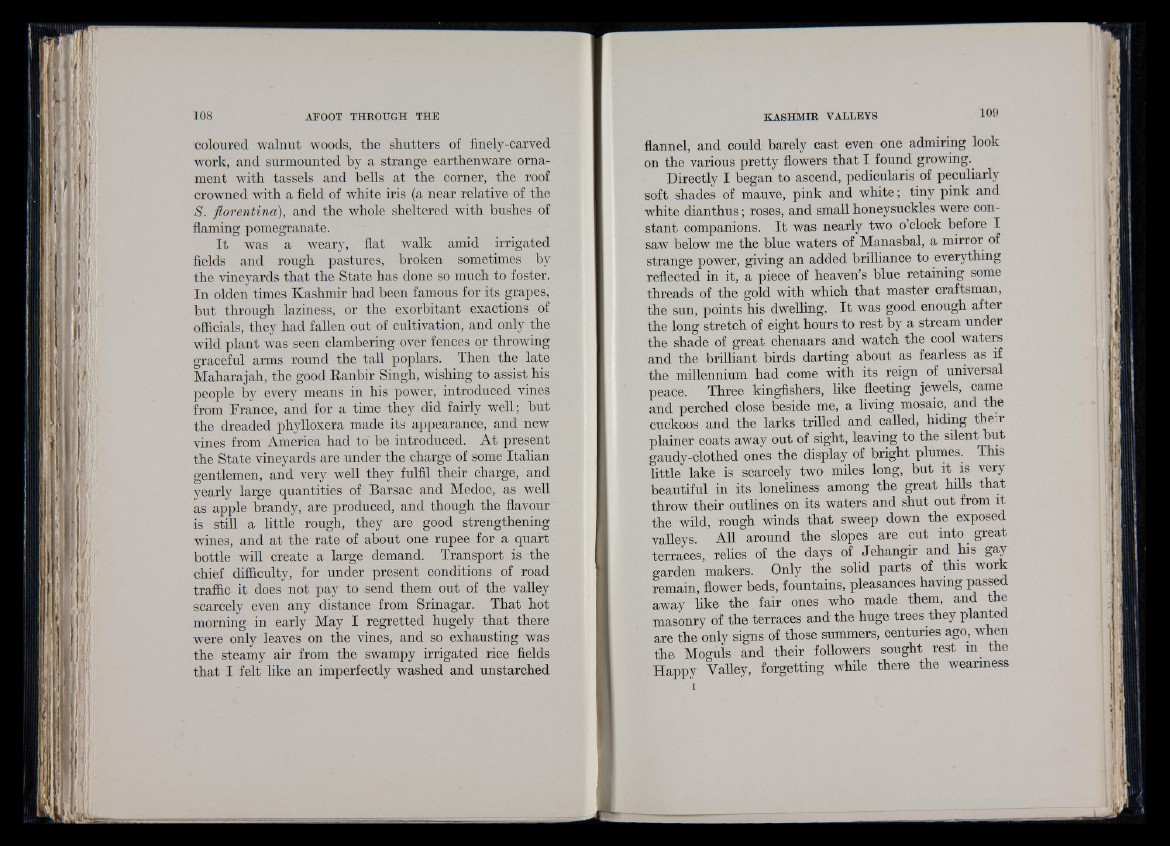
coloured walnut woods, the shutters of finely-carved
work, and surmounted by a strange earthenware ornament
with tassels and bells at the corner, the roof
crowned with a field of white iris (a near relative of the
S. florentina), and the whole sheltered with bushes of
flaming pomegranate.
I t was a weary, flat walk amid irrigated
fields and rough pastures, broken sometimes by
the vineyards that the State has done so much to foster.
In olden times Kashmir had been famous for its grapes,
but through laziness, or the exorbitant exactions of
officials, they had fallen out of cultivation, and only the
wild plant was seen clambering over fences or throwing
graceful arms round the tall poplars. Then the late
Maharajah, the good Eanbir Singh, wishing to assist his
people by every means in his power, introduced vines
from France, and for a time they did fairly well; but
the dreaded phylloxera made its appearance, and new
vines from America had to be introduced. At present
the State vineyards are under the charge of some Italian
gentlemen, and very well they fulfil their charge, and
yearly large quantities of Barsac and Medoc, as well
as apple brandy, are produced, and though the flavour
is still a little rough, they are good strengthening
wines, and at the rate of about one rupee for a quart
bottle will create a large demand. Transport is the
chief difficulty, for under present conditions of road
traffic it does not pay to send them out of the valley
scarcely even any distance from Srinagar. That hot
morning in early May I regretted hugely that there
were only leaves on the vines, and so exhausting was
the steamy air from the swampy irrigated rice fields
that I felt like an imperfectly washed and unstarched
flannel, and could barely cast even one admiring look
on the various pretty flowers that I found growing.
Directly I began to ascend, pedicularis of peculiarly
soft shades of mauve, pink and white; tiny pink and
white dianthus; roses, and small honeysuckles were constant
companions. I t was nearly two o’clock before I
saw below me the blue waters of Manasbal, a mirror of
strange power, giving an added brilliance to everything
reflected in it, a piece of heaven’s blue retaining some
threads of the gold with which that master craftsman,
the sun, points his dwelling. I t was good enough after
the long stretch of eight hours to rest by a stream under
the shade of great chenaars and watch the cool waters
and the brilliant birds darting about as fearless as if
the millennium had come with its reign of universal
peace. Three kingfishers, like fleeting jewels, came
and perched close beside me, a living mosaic, and the
cuckoos and the larks trilled and called, hiding their
plainer coats away out of sight, leaving to the silent but
gaudy-clothed ones the display of bright plumes. This
little lake is scarcely two miles long, but it is very
beautiful in its loneliness among the great hills that
throw their outlines on its waters and shut out from it
the wild, rough winds that sweep down the exposed
valleys. All around the slopes are cut into great
terraces, relics of the days of Jehangir and his gay
garden makers. Only the solid parts of this work
remain, flower beds, fountains, pleasances having passed
away like the fair ones who made them, and the
masonry of the terraces and the huge trees they planted
are the only signs of those summers, centuries ago, when
the Moguls and their followers sought rest in the
Happy Valley, forgetting while there the weariness